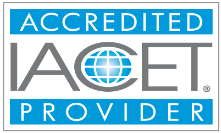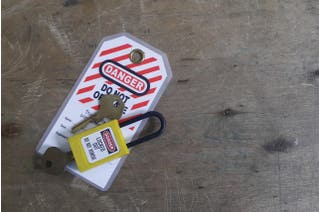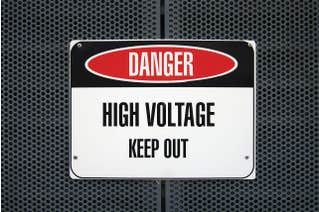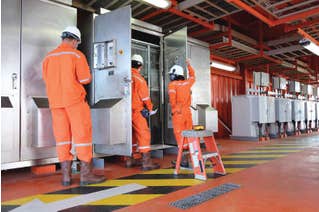This site uses cookies to store information on your computer. Some are essential to make our site work; others help us improve the user experience or allow us to effectively communicate with you. By using the site, you consent to the placement of these cookies. Read our cookie policy to learn more.
The National Fire Protection Association (NFPA) 70E for Electrical Safety for Supervisors is a certificate of completion training designed for employees seeking employer authorization as a supervisor. The course addresses electrical safety in the workplace as applicable under the NFPA 70E standard, emphasizing both supervisory and management responsibilities for ensuring safe work practices around electrical hazards.
Participants in the course will learn the importance of the NFPA 70E standard and how it works in conjunction with OSHA regulations, to provide requirements for an employer's electrical safety program. In addition, the participants will learn what electrical hazards are, and how to perform shock and arc flash risk assessments, and locate approach boundaries-all from a management perspective.
NOTICE: Basic training in electrical safety is assumed prior to taking this course.
Choose the right version for you: ClickSafety offers multiple versions of this course. Please check the requirment of your employer and/or state to select the appropriate version:
2018 Edition: This version of the course provides training pertaining to the 2018 edition of the NFPA 70E standards.
2021 Edition: This version of the course provides training pertaining to the 2021 edition of the NFPA 70E standards.
2021 w/ Voice Authentication: This course uses Voice Authentication, a requirement in certain states to meet online course proctoring requirements. These voice-authenticated courses represent a best practice to ensure the identity of the student by prompting users to verify their voice at random intervals throughout the course. Users must have access to a mobile phone or landline while taking the course to successfully meet this requirement.
2024 Edition: This version of the course provides training pertaining to the 2024 edition of the NFPA 70E standards. Several significant changes were made to the 2024 edition of the NFPA 70E, including the following:
- Changes were made regarding how employers approach energized work. Each company must now include an electrically safe work condition program in their electrical safety program audit and update.
- Informative Annex S – Assessing the Condition of Maintenance. This is a new informative annex that provides guidance to assist qualified workers to identify information that is useful when assessing the condition of maintenance of electrical equipment.
- Hazard thresholds for capacitor stored energy values have been revised.
- A major revision was made to Arc Flash PPE categories for DC.
- An emergency response plan has been added to the list of required information for the job safety planning.
2024 w/ Voice Authentication: This course uses Voice Authentication, a requirement in certain states to meet online course proctoring requirements. These voice-authenticated courses represent a best practice to ensure the identity of the student by prompting users to verify their voice at random intervals throughout the course. Users must have access to a mobile phone or landline while taking the course to successfully meet this requirement.
ClickSafety’s online NFPA 70E Electrical Safety for Supervisors course is designed to aid supervisors and managers that are responsible for developing electrical safety programs and providing training and oversight for qualified persons in the electrical industry in alignment with NFPA 70E standard. Specific course topics covered include:
- A Supervisor’s Role in Electrical Safety
- Standards for Electrical Safety in the Workplace
- Changes to the 2024 Edition of NFPA 70E
- Electrical Safety Program (ESP)
- Employer and Employee Responsibilities
- Ensuring Your Employees are Qualified
- Identifying and Training Qualified Persons
- Electrical Hazards in the Workplace
- General Requirements for PPE
- Arc Flash Protection PPE
- Shock Protection PPE
- Electrical Equipment and Protective Equipment Maintenance
The NFPA 70E Electrical Safety for Supervisors online safety course is designed for those who are responsible for employees who may work around potential workplace electrical hazards in any and all industries. The course is ideal for those who already have basic training in electrical safety and require a more in-depth training. Participants may include:
- Employees – where they are in charge of other employees that may be exposed to electrical hazards.
- Lead Electricians
- Supervisors
- Managers
If you have any concerns as to whether this course is appropriate for you or your industry, please browse our full selection of Online Courses and Safety Packs, call 800-971-1080, or Contact Us online.
ClickSafety’s online NFPA 70 Electrical Safety for Supervisors course teaches individuals in all industries the NFPA 70E standard and electrical safety in the workplace. Participants of the course can expect:
- Supervisory level information for those responsible for workers potentially exposed to the hazards of electrical work
- A comprehensive description of basic requirements for protecting workers from electrical hazards
Upon completion of the course, participants will take a proficiency assessment to test their knowledge of the learning objectives taught.
- great
Posted on
0.2
CEUs
CEU Requirements
To receive CEU credit for taking this course, you must:
• Pass the knowledge checkpoints and complete the entire course.
• Complete the course evaluation form at the end of the course.
Upon successful completion, you will receive a certificate showing the CEUs earned.






